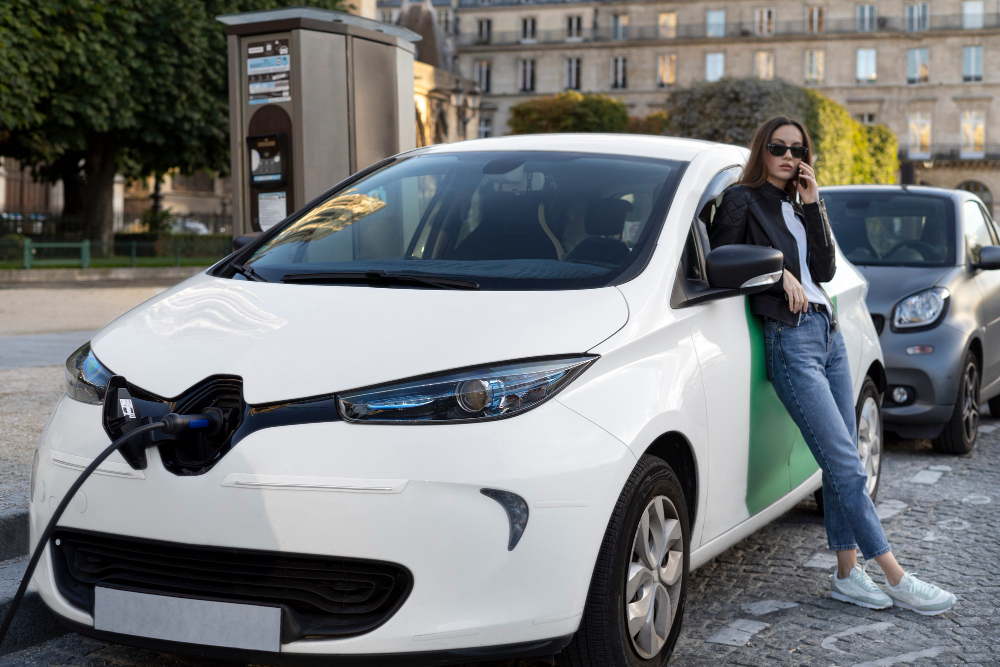Last updated on
Electric vehicles (EVs) are rapidly emerging as a key player in the pursuit of environmental sustainability. With an increasing global awareness of the environmental implications of carbon emissions, the transition from gasoline-powered vehicles to electric ones marks a significant stride in mitigating climate change.
This section will delve into how EVs contribute to environmental sustainability, by exploring their efficiency, reduction in emissions, and their role in fostering a cleaner, more sustainable future.
Improved Energy Efficiency

Electric vehicles are known for their superior energy efficiency compared to traditional internal combustion engine vehicles. Because they convert over 77% of the electrical energy from the grid to power at the wheels, the energy wastage is significantly less.
This is in stark contrast to gasoline cars, which only convert 12%–30% of the energy stored in gasoline to power the wheels. The higher efficiency of EVs translates directly into less energy consumption for the same travel distance, thus conserving natural resources.
EVs also offer regenerative braking systems, which recover energy normally wasted during braking and feed it back into the battery. This further enhances overall vehicle efficiency. In addition, electrical energy can be produced from a variety of sources, including renewable ones.
The energy efficiency of EVs is continually improving with advances in technology. This includes incremental improvements to the energy density of batteries and breakthroughs in material science that make cars lighter and more efficient, without compromising safety standards.
The charging system infrastructure is also evolving, making it possible to charge EVs faster and more conveniently. It is expected that with these advancements, the energy efficiency of EVs will only continue to increase, making them an even more viable and sustainable mode of transportation.
Reduction in Greenhouse Gas Emissions
Electric vehicles play a crucial role in reducing greenhouse gas emissions. As they run solely on electricity, EVs produce zero tailpipe emissions, contributing significantly less to air pollution than their gasoline counterparts. This is especially beneficial in urban areas, where air quality often suffers due to high concentrations of vehicles.
Moreover, the source of electricity significantly impacts the emissions of EVs. As more renewable energy sources are integrated into national electrical grids, the emissions from electric vehicles can be further reduced. In regions where the electric grid relies heavily on renewables, EVs can have a significantly smaller carbon footprint.
While it’s true that manufacturing electric vehicles, particularly their batteries, can produce higher emissions than the production of gasoline cars, a comprehensive life-cycle analysis shows that this initial carbon footprint is more than compensated by the lower operational emissions over the vehicle’s lifetime.
Role in Grid Stability and Energy Storage

Electric vehicles can also contribute to grid stability. With smart charging technologies, EVs can be charged during off-peak periods when demand for electricity is low and renewable energy production, particularly wind and solar, is high. This helps to balance the grid, reducing the need for energy storage and peak power plants.
Furthermore, electric vehicles can potentially act as mobile energy storage units, storing excess electricity during times of low demand and feeding it back into the grid during peak periods. This concept, known as vehicle-to-grid (V2G) technology, has the potential to revolutionize how we manage our power systems and further enhance the sustainability benefits of electric vehicles.
As the number of electric vehicles on the road increases, so does the potential for using EVs as a grid resource. Realizing this potential, however, will require significant advances in vehicle and charging infrastructure technology, as well as suitable regulatory frameworks.
Decrease in Noise Pollution
Another environmental benefit of electric vehicles is the reduction in noise pollution. Electric motors are incredibly quiet compared to gasoline-powered engines. This can significantly decrease noise pollution in urban areas, leading to quieter cities and improving the quality of life for residents.
While some noise from tire friction and air movement is unavoidable, the overall noise levels are still much lower than those from gasoline cars. However, it’s worth noting that extremely quiet vehicles can present a safety issue for pedestrians, leading to regulations requiring artificial noise at low speeds.
Despite this, the lower noise levels of EVs can have broader social benefits, reducing stress caused by noise pollution and contributing to better sleep and overall health.
Promotion of Renewable Energy
Electric vehicles have the potential to stimulate the growth of renewable energy. By increasing the demand for electricity, they can drive investment in renewable energy sources such as wind and solar. EVs can effectively store and use electricity produced by these resources, which is not always the case with traditional power grids.
Another important aspect is that EV charging can be flexible. By utilizing smart charging technologies, EVs can be programmed to charge when renewable energy production is high, further enhancing the use of clean energy.
Overall, the transition to electric vehicles presents a significant opportunity to reduce our reliance on fossil fuels and move towards more sustainable and renewable sources of energy. The symbiotic relationship between EVs and renewable energy not only benefits the environment but also paves the way for a sustainable and green future.
The Takeaway
Electric vehicles play a crucial role in promoting environmental sustainability. With their superior energy efficiency, reduction in emissions, potential for grid stability and energy storage, decrease in noise pollution, and promotion of renewable energy sources, EVs offer a sustainable solution to transportation.
As we continue to advance technology and improve infrastructure, the environmental benefits of electric vehicles will only continue to grow, making them an essential part of our journey toward a greener and cleaner planet.
Table of Contents




